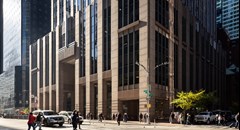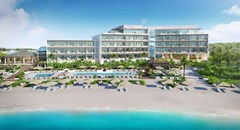By Dana Rubinstein | NY Times
The scrum of millionaires and billionaires hustling for the right to build a casino in New York City now includes Larry Silverstein, the real estate magnate who redeveloped much of the World Trade Center site after the Sept. 11 attacks.
Mr. Silverstein, 92, has never owned or invested in a casino. But he controls a site at 11th Avenue and 41st Street, four blocks west of Times Square, that he says is perfect for one because it borders several neighborhoods but is central to none. For that reason, his team argues, the location is less likely than others to raise residents’ hackles.
He has teamed up with Watche Manoukian, a businessman based in London who owns Parx Casino in Bensalem, Pa., that state’s highest grossing venue.
In an interview on Thursday, Mr. Silverstein suggested his bid was largely selfless: New York State, he said, needs tax revenue to support the transit system on which New York City’s economy depends. Casinos can provide it, and as a major landlord, he is invested in the city’s future.
“We do see it as a genuine need that the community has, the city and Albany,” Mr. Silverstein, the chairman of Silverstein Properties, said. “Will it be profitable? I presume so because generally, this has been the case with casinos at large.”
It is a novel argument in a crowded, well-financed field of competitors with unique pitches (one proposal involves a roller coaster; another, a Ferris wheel). About 10 teams are expected to bid for one of up to three casino licenses in the region.
The field includes SL Green Realty Corporation, which calls itself the city’s largest commercial landlord and wants to build a casino in Times Square with Caesars Entertainment; the Hudson Yards developer Related Companies and Wynn Resorts, which have proposed a casino on Manhattan’s Far West Side; the hedge fund manager Steven A. Cohen, who owns the New York Mets and has developed a bid with Hard Rock for a casino next to the team’s Queens stadium; and Las Vegas Sands, which wants to put a casino in Nassau County.
Some people involved in the bidding expect that two of the three available licenses will go to Resorts World New York City at Aqueduct Racetrack in Queens and the Empire City Casino in Yonkers. The two so-called racinos, or slot machine parlors attached to horse tracks, are seeking full-scale casino licenses.
“We think one is going to go to Yonkers,” Marty Burger, the chief executive of Silverstein Properties, said. “And one is going to go to Aqueduct.” The third, he believes, is “up for grabs.”
State officials have not set a deadline for the submission of bids, and the approval process is expected to extend into next year. But Mr. Silverstein’s announcement is probably among the last major proposals to be unveiled before the formal bidding begins.
Mr. Cohen has not put forth his proposal, but some details have begun to emerge. It involves turning a parking lot into a 25-acre park with a casino and connections to Flushing Bay, with a design by SHoP Architects, the firm that designed Barclays Center, according to a person who has seen the proposal.
On Wednesday, on the 38th floor at 7 World Trade Center, which Silverstein Properties owns and where it has its headquarters, company executives pitched local elected officials on their project, a 1.8-million-square-foot development called the Avenir, the French word for “future.”
Codesigned by Nancy Ruddy of the CetraRuddy architecture firm, the building would consist of two 46-story towers connected by a sky bridge and resting on an eight-story podium. It would house at least one hotel, about 100 units of income-restricted housing, a penthouse performance hall and, at its base, the casino.
Political sentiment in Manhattan remains an obstacle.
“I don’t feel like there’s any momentum from actual voters or people who live here for a casino in Manhattan,” said Liz Krueger, a Democrat who chairs the State Senate’s Finance Committee.
State Senator Brad Hoylman-Sigal and Councilman Erik Bottcher, whose districts include the proposed site, attended the Wednesday meeting. Both declined to comment on the proposal.
Like the Related Companies’ proposal, the Silverstein casino would be near the Javits Convention Center and its steady stream of event attendees. But unlike Related’s proposal, which would probably rise on a not-yet-built platform over a rail yard, Mr. Burger described the Silverstein site as “shovel-ready.”
Mr. Silverstein’s plot of land still houses the foundation of an old Mercedes-Benz dealership. On Thursday, the rocky land beneath the foundation, crisscrossed by graffiti-covered Amtrak rail tunnels, had at least one resident: a young man who declined to give his name and said he had been living there for about a year and a half. The tunnels were strewn with discarded clothing and a Citi Bike.
Casinos are a new interest for Mr. Silverstein. “I don’t go to racetracks,” he told the luxury real-estate publication Mansion Global in 2017. “I don’t go to the casinos. I don’t do any of that, but I enjoy buying real estate.”
On Thursday, Mr. Silverstein said his own distaste for gambling was beside the point.
“My personal predilections are subordinated to the needs of the community at large,” he said.


